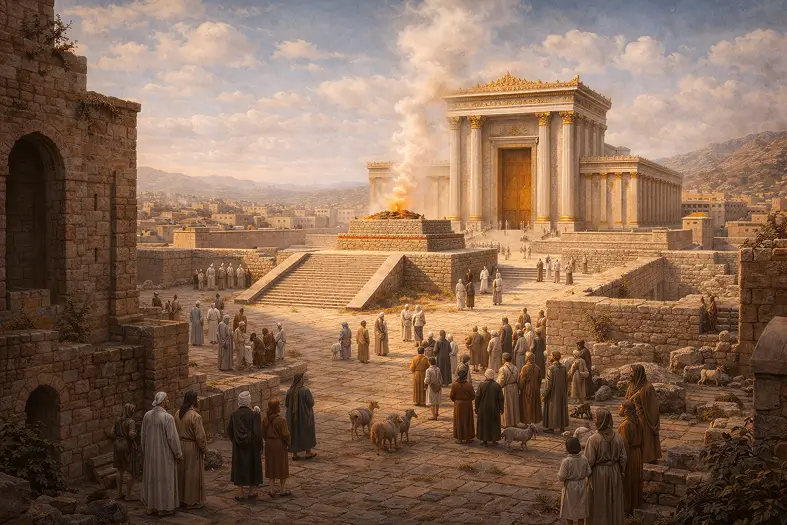


The Torah commands that a Sanctuary be built for Hashem, a sacred dwelling place where His Presence rests among Israel.
This mitzvah commands the Jewish people to build a Sanctuary — ultimately the Beis HaMikdash — as a dwelling place for the Shechinah in this world. The Torah’s command, “וְעָשׂוּ לִי מִקְדָּשׁ”, establishes that holiness must be given a physical center, a place where the nation gathers, serves Hashem, and experiences Divine closeness. From the Mishkan in the wilderness to the First and Second Temples in Yerushalayim, the Sanctuary expresses the covenant between Hashem and Israel, transforming physical materials into vessels of holiness and turning the national heart toward Avodas Hashem.
Rambam
Sefer HaChinuch
Rashi
Ramban
Talmud
Midrash & Chazal
Acharonim & Modern Torah Giants
Chassidic & Mussar Classics
Contrast with Mitzvah 304 — To Show Reverence for the Temple
Parallel to Mitzvah 77 — Daily Prayer
Building Inner Sanctuaries
Centrality of Communal Worship
Yearning for Redemption
Sanctifying the Physical World
National Spiritual Identity
Daily Direction Toward Holiness


Concerns the Beit HaMikdash, korbanot (offerings), and priestly service.
Represents the concept of spiritual intentionality, purity, and sanctity—set apart for a higher purpose.
Tied to the eternal covenant between G‑d and the Jewish people, including signs like brit milah and Shabbat.
Represents Emunah—the deep, inner trust in Hashem’s presence, oneness, and constant involvement in our lives. This badge symbolizes a heartfelt connection to G-d, rooted in belief even when we cannot see. It is the emotional and spiritual core of many mitzvot.
Associated with belief in and obedience to G‑d’s prophets, as well as reverence for their role in transmitting Divine truth.
Mitzvot that strengthen communal life — showing up, participating, supporting, and belonging. Community is where holiness is shared, prayers are multiplied, and responsibility becomes collective.
Signifies awe and reverence toward Hashem—living with awareness of His greatness and presence.
Mitzvot that define and deepen the relationship between a person and their Creator. These include commandments involving belief, prayer, Shabbat, festivals, sacrifices, and personal holiness — expressions of devotion rooted in divine connection.

Dive into mitzvos, prayer, and Torah study—each section curated to help you learn, reflect, and live with intention. New insights are added regularly, creating an evolving space for spiritual growth.

Explore the 613 mitzvos and uncover the meaning behind each one. Discover practical ways to integrate them into your daily life with insights, sources, and guided reflection.

Learn the structure, depth, and spiritual intent behind Jewish prayer. Dive into morning blessings, Shema, Amidah, and more—with tools to enrich your daily connection.

Each week’s parsha offers timeless wisdom and modern relevance. Explore summaries, key themes, and mitzvah connections to deepen your understanding of the Torah cycle.